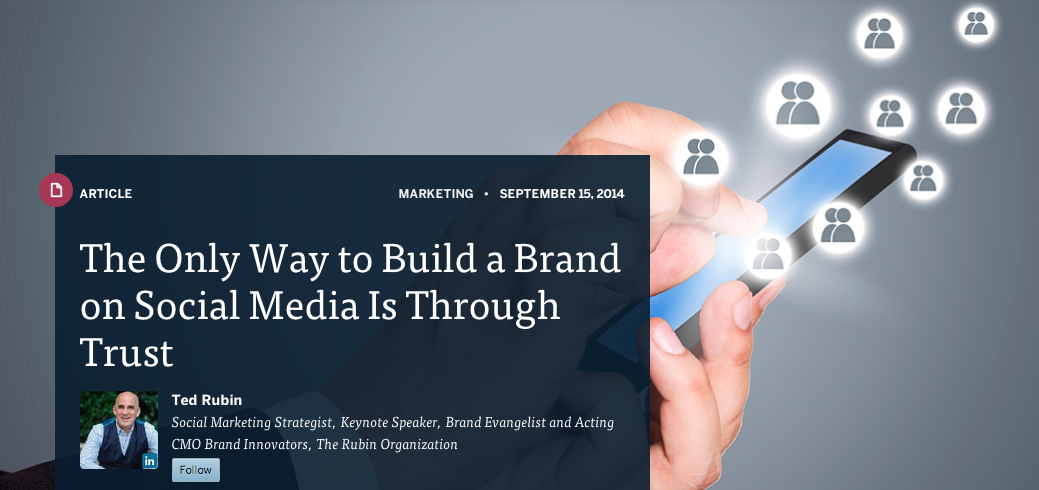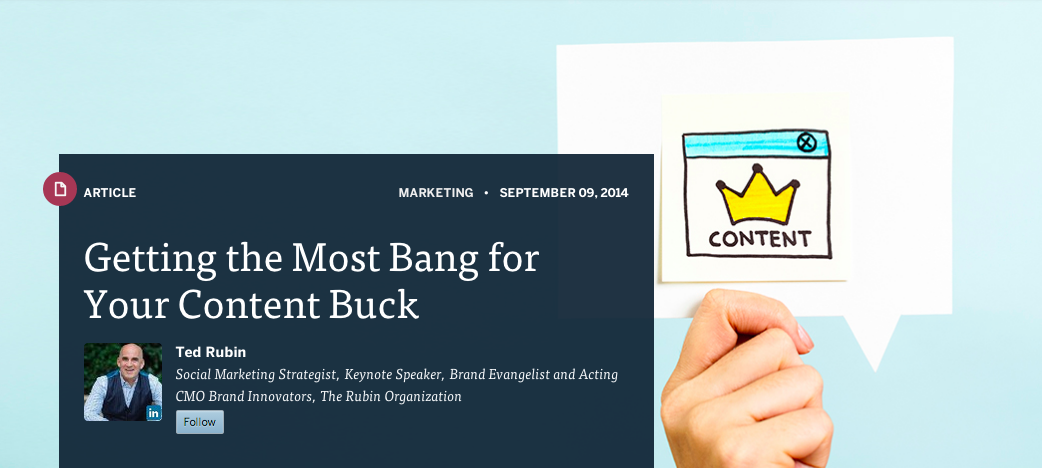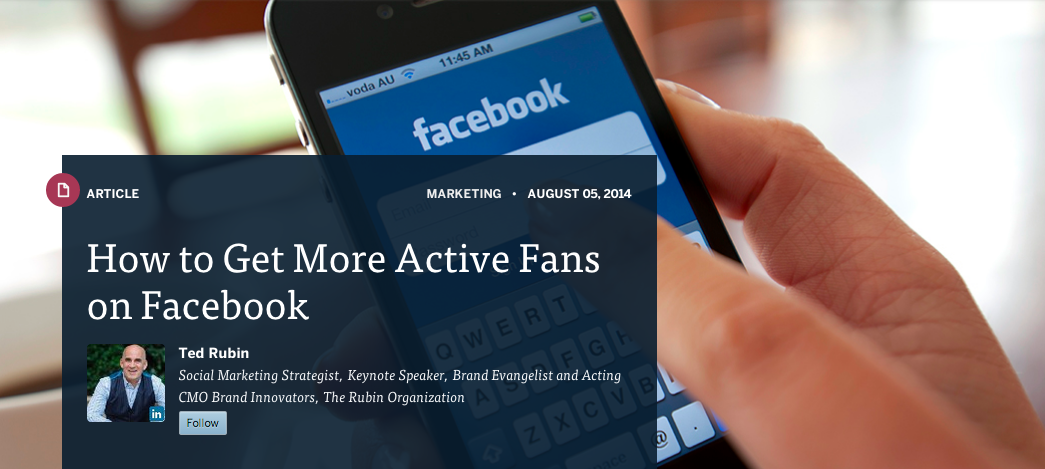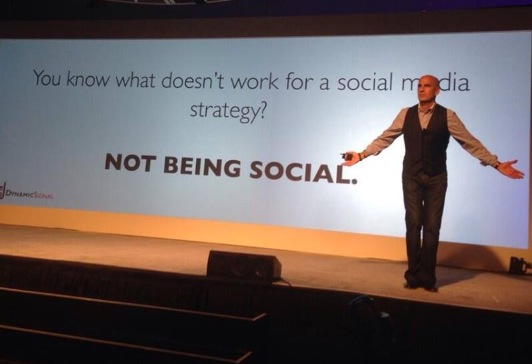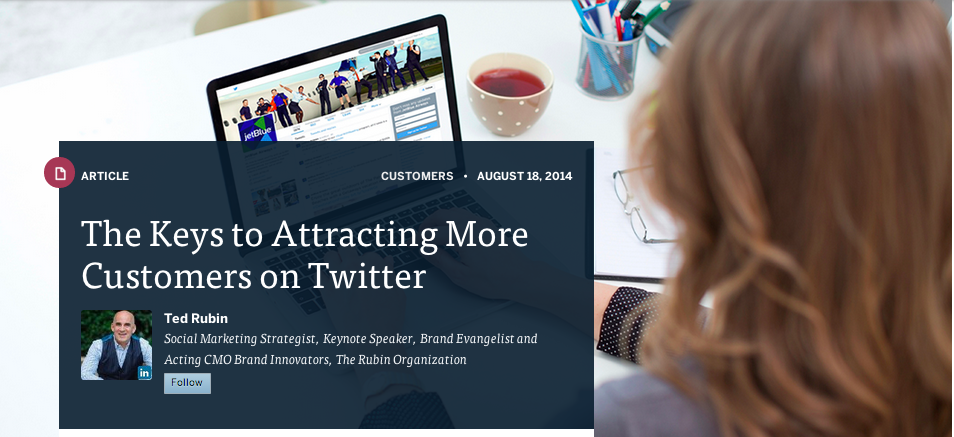—–Whether you’re building your personal brand, your business brand or both, one thing remains true: You need content to help you build trust and followers.
 Ted Rubin
Ted Rubin
How to Market to Women Using Social Media
Many women pride themselves on being savvy consumers who can sniff out a poseur brand. Brands need to be the conduit for information to women from other women and from experts, but be wary of star power – celebrities don’t cut it. Marketers that have a woman’s trust have worked to earn it, by making good products, offering relevant advice and engaging those women. All peers have influence to some degree, especially when marketing to women so the more you understand and relate to the community the better off the brand. If you market to women. recognize and benefit from the value women place on authenticity. Women are busy with multiple responsibilities so keep your site’s navigation intuitive and simple, and keep your message clear and concise.
In War and Business, Complacency Isn’t an Option
I’ve said before that business and war have much in common. Entrenched companies keep doing what got them there, just as victors in war tend to fight subsequent battles with the same tried-and-true tactics.
Getting the Most Bang for Your Content Buck
—–“Now that you’ve taken the time to create targeted content for your audience, learn how to share it over and over again to build a loyal following.”
Super Easy Fishing Lessons for Modern Marketers ~via @InsideCXM
There are some great marketing lessons to be taken from fishing, and I’m not talking about the “ph-” variety. If you’ve ever been fishing with an expert, on that expert’s home turf, you know that it can be an almost artistic experience. Before your boat even hits the water, your expert companion tells you where the fish will be, when they’ll be there, the bait or equipment most likely to appeal to those fish, and the techniques you’ll need to land them. It can all seem a bit much to the uninitiated, until you reach the fishing spot and the expert is either proven correct, or ready to adjust on the fly to the day’s conditions. Either way, you’ll soon be catching fish.
What the heck does this have to do with marketing? People are much more sophisticated than fish, of course, but otherwise many of the same principles apply to marketing on social. The best way to catch fish is to give them what they want. The easiest way to find out what they want is to study them intently. In this way, people and fish are not so different.
Finding the Perfect Fishing Hole
It all starts with knowing what you’re looking for, and learning where to find it. Fortunately for us, social sites don’t guard that information like fishing experts do. You can find solid, if imperfect, demographic information about most social sites. Before you start dropping lines in the water, visit the most promising sites and listen to the discussions. It’s a bit like detective work. Follow the best leads, and eventually you’ll find the people you’re seeking.
Selecting the Right Bait
Once you find what you’re looking for, listen some more. Pay attention to what people post and how they interact with one another. Get involved in the conversation, and make note of what you learn as you go. Always remember to be courteous, listen intently, and respond in a personal, meaningful way. All of these techniques will help you find the perfect bait to reel in new customers. In order to land them, first you need to understand them.
As you continue to listen, you’ll also learn why people congregate in a given place. Learning where to find the fish might lead to a banner day. Learning why they congregate where they do will keep those banner days rolling well into the future.
Landing the Prize
You know where to find your audience, and you know what they want. Now all you need to do is go out there and make the catch. If you’ve done your homework, you’ll be in great position to succeed. You can’t expect things to go perfectly every time, though. A fishing expert is defined as much by their ability to adapt as their ability to plan.
If your plan falls to pieces, listen some more. Learn all that you can, as you go. Expect the unpredictable, and be prepared to move on to another plan when the time is right. You can’t learn everything about fishing overnight, and the same is true of social. The more you listen and learn, the more prepared you’ll be to adapt when an unexpected outside influence forces you to change course.
Sustaining Success
People are much more willing to be “caught” than fish, as long as you offer value for their attention and loyalty. Once more, it all comes back to listening. Build your buyers’ personas with the same zeal the fishing expert shows in profiling fish. The medium and methods may change over time, but as long as you know your audience, treat them with respect, and build relationships, you’ll be ready for anything.
Originally posted at InsideCXM AUGUST 18, 2014 BY
Wanted… Sensitivity Training on Social Channels ~via @InsideCXM
We’ve all seen cringe-worthy moments on social, when someone says the exact wrong thing and doesn’t even realize what they’ve done. It happens in debates over hot-button issues, comment threads on brand pages and everywhere in between. Even well-meaning comments can be hurtful when context is ignored.
How to Get More Active Fans on Facebook
—–“Want to turn “lurkers” into active participants on your Facebook page? Learn what it takes to really connect with your Facebook visitors.”
What Doesn’t Work for a Social Media Strategy
You know what doesn’t work for a social media strategy? Not being social. It might sound like common sense, but all too often, being social is overlooked in a social media strategy. It’s not enough to just start accounts with all the most popular social media tools and community sites, even when you include professionally-designed graphics and a big bold display of your logo and a few text lines about your brilliant mission. First and foremost, you absolutely must BE SOCIAL!
How to Increase Blog Traffic…
For me it is not about tools, but about strategy, and execution. Here are a few things to consider in addition to just posting articles and working the SEO angle…
1. User-Friendly Navigation: Keeping your blog easy to navigate with intuitive category labels will help people find the information they seek much faster. Also, make it easy for readers to leave comments and share your posts on various channels that will help lead others back to you.
2. Look for Holes in Your Competition: Take a look at your competition’s blogs and websites. Are there content holes they’ve missed that you can take advantage of? Ways to add value not already available and help you stand out. Those consistently provide lots of content have a bigger chance of attracting people who are actively looking for information.
3. Don’t Close Your Comments: Don’t close the door for people to leave comments on your blog; doing so leaves the impression that you only care about what you have to say and are not willing to be responsive to others. Seth Godin can do it, and it sure works for him, but until you are playing in that league, don’t go there.
4. Commenting on Other Blogs: Look for other blogs in your industry that have a good amount of traffic and comments, and contribute a comment, but only if you think you can add value to the conversation. Be careful not to promote your blog here; just add some insight, and do it on a regular basis. Make seeking out and commenting on other blogs a part of your daily activities. The more you contribute to the conversation happening around you, the more you’ll be seen as a thought-leader (and people will click on your link to check you out).
5. Syndicate, syndicate, syndicate… share your content via all social channels always including Twitter, Facebook, Google+ and LinkedIn, which also makes it easy for others to share. And don’t be afraid to do it more than once periodically sharing old posts via your social channels, especially those that were well received. Also let others freely repost your content with a link back to the original post.
Welcome to the ‘Age of Influence,’ where anyone can build an audience and effect change, advocate brands, build relationships and make a difference.
The Keys to Attracting More Customers on Twitter ~ via @OPENForum
“Seeking a real return on your social media relationships? Prove your business is customer obsessed by employing the Twitter strategies of companies that “get it.”
It’s one thing to say you’re customer obsessed on social media and quite another to show you mean it. Modern consumers are social media savvy, and they can spot the difference, so if you want a real “return on your relationships” (#RonR), you’ve got to be truly customer obsessed on all your social media platformsTo highlight that point, let’s take a closer look at two large companies, JetBlue and Duane Reade, that do an excellent job of putting the customer-obsessed concept into action on social channels. While you may not have their resources, you can certainly pick up a few tips so your small business truly connects with customers.
JetBlue Airways
Being customer obsessed requires paying attention to the little details, and it’s clear that JetBlue “gets it” from the moment you visit the airlines’ Twitter page. You can see the company is focused on customers even before you read a single tweet, thanks to its effective use of Twitter’s profile page functions.Let’s take a look at the details:
– JetBlue’s Twitter page has close to 2 million followers, which is strong but not out of line when compared to other major airlines. The “following” count is what really stands out, though, clocking in at more than 100,000. Check out the follower/following ratios of other popular accounts, and you’ll quickly see that JetBlue is way out in front on the number of other Twitter accounts it follows.
– Take a look at the company’s profile blurb. “Hi, nice to tweet you!” is pleasant and warm, a stark contrast to the all too common “The Official Twitter Page of …” opening. After that, you get a quick, relevant description of the company, followed by multiple contact options. It’s all framed under a welcoming cover photo that’s light on logos but heavy on diversity and smiles.
– JetBlue does a nice job tweeting a mix of customer-focused contests, clever hashtags and charity drives, but its replies to customers are what really stand out. There are no form messages or any other signs of automation. When a customer tweets @JetBlue, they know they can expect a personalized response, coming from a real human being. JetBlue also does a great job of sharing fun travel photos from its followers.
Duane Reade
There’s more than one right way to be customer obsessed on Twitter, and drugstore chain Duane Reade gets there in a slightly different fashion than JetBlue. Both of these companies’ profile pages are well done, and both companies follow more accounts than average.The difference comes in the content of the tweets, and the information each company chooses to share. See what I mean:
– Duane Reade is based in New York City, and the city is a constant theme in their tweets. It’s a great way of saying “We live here, and we care about this place, too!” Duane Reade’s Twitter feed is also full of tweets about area events but not in a self-serving way. Most of the events the company tweets about have little or no apparent connection to the company.
– You’ll also find plenty of photo and video content shared on Duane Reade’s Twitter stream. Cityscapes bump up against silly pet pictures and odes to things like National Hammock Day in a way that makes the account feel more personal than corporate, which is tough to pull off.
– Like JetBlue, Duane Reade does a great job of replying to customers in a personal, timely way and sharing customer tweets. The company also embraces the language and intent of social media, dropping in the occasional bit of Internet slang or emoticon, and linking its various social feeds together.
In the end, customers want to be treated like human beings, not data points, and both JetBlue and Duane Reade embrace that with every detail. It all starts, though, with simple things. Reply to people promptly, with personalized messages, and share relevant, interesting content.The effort you put into being customer obsessed will be more than reciprocated by the return on relationship you build as a result.
Photo: iStockphoto
Originally posted AUGUST 18, 2014 American Express Open Forum blog
